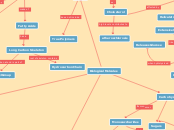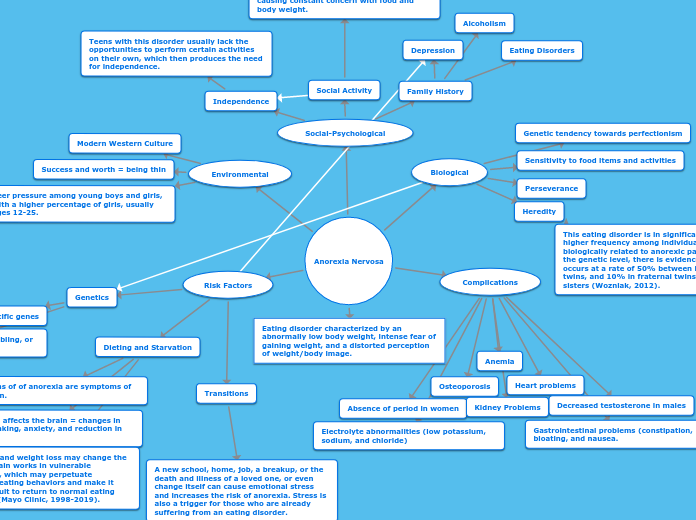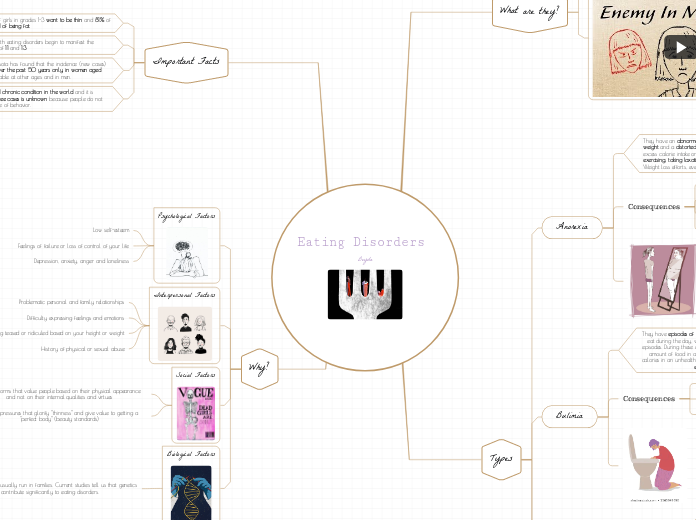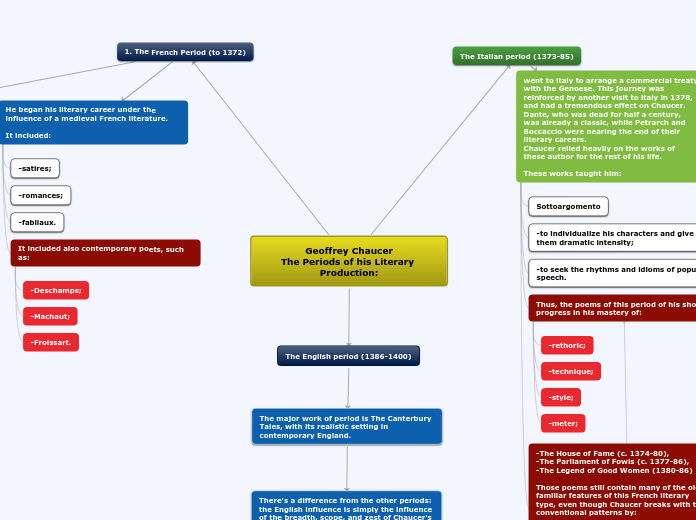Floating topic
Nucleoside
Gene expression
External environment
Hydrogenated
Transfat
Energy
Thermodynamics
Gibbs Free Energy
equilibrium
max stability
unstable
more work capacity
stable
less work capacity
2nd law
entropy of universe is always increasing
1st law
E in universe is constant
kinetic energy
movemnet
potential energy
stored
Cellular Respiration
4 main stages
Chemiosmosis
concentration gradient
liberates energy
phosphorylate ADP to ATP
electron transport chain
reduces coenzyme
FADH2
2 ATP
NADH
3 ATP
NADH dehydrogenase
electron acceptors
redox reactions
free energy
actively pump protons
electrons move down
Kreb's cycle
6NADH
2ATP
4CO2
2FAD2
2 acetyl CoA
2 Oxaloacetate
2 citrate
many changes
citric acid cycle
pyruvate oxidation
matrix of mitochondrion
glycolysis
glucose
activated glucose
confines glucose in cell
cytoplasm
under anaerobic conditions
breakdown of glucose
harvesting E from organic compounds
oxidizing glucose
small amounts of E are released at a time
enzymes
catabolic
exothermic
Photosynthesis
C4 Photosynthesis
malate
CO2 +Pyruvate
bundle sheath cells
Chloropast
thylakoid
light reaction
grana
stroma
Dark reaction
Dark reactions (Calvin cycle)
Carboxylation
merging of 6CO2+RuBP --12PGA
reduction
12 ATP +12 NADPH
12 PGAL from !2 PGA
regeneration
6 ATP used to make 10 PGAL---6 RuBP
carbohydrate synthesis
2PGAL---Glucose
Light reactions
chemiosmosis
protons
thalakoids
gradients
ATP Synthase
1-2 ATP
Photosystem II (p680)
2 electrons
ETC
Primary electron acceptor
Photosystem I
2 NADPH
CAM PHotosynthesis
take place at night
H2O loss
PEP Carboxylase
oxaloacetate
Malic acid
vacuole
Photorespiration
inefficient
Metabolism
Anabolic pathway
endergonic reactions
consume energy
Catabolic pathway
exergonic reactions
releases energy
Genetics
Happens at the same time
Translation
Stages
Termination
release factor
Stop codon
UGA
UAA
UAG
Elongation
1st and 3rd step
Elongation factors
Initiation factors
translation initiation complex
tRNA
anticodon
Ribosome
Bound ribosome
signal peptide
Signal-recognition particle
Endomembrane system
Plasma membrane
vacuoles
lysosome
Golgi apparatus
nuclear envelop
ER
Free ribosomes
cytosol
Small Subunit
mRNA binding site
Large subunit
E site
tRNAs
A site
holds the next tRNA
P site
tRNA carrying growing polypeptide chain
coupling of tRNA anticodons with mRNA condons
info in mRNA
Transcription
RNA Processing
RNA Splicing
Spliceosome
Exons
coding
Introns
noncoding
Poly-A Tail
Degrading
Export of mRNa
5' cap
Molecular components
Transcription unit
Upstream
Downstream
Promoter
TATA Box
RNA Polymerase
Codons
nucleotide bases
termination
Polyadenylation signal sequence
Polyadenylation signal
elongation
nucleotides
3' end
RNA Poly.
Initiation
Transcription Factors
DNA Replication
nucleotide excision pair
DNA Ligase
DNA Polymerase I
DNA nucleotides
DNA Polymerase III
New DNA Strand
Primase
RNA Primer
Topoisomerase
Breaking and rejoining strands
Single strand binding protein
Single stranded DNA
helicase
Double Helix
Experiments
Meselson and Stahl
3 models
dispersive model
semiconservative model
conservative model
Semiconservative
Hershey and Chase
DNA function as genetic material
Chargaff's rules
% of C and G are about equal
% of A and T bases are about equal
Tag DNA
bacterial cell
Tag protein
Griffith's experiment
R (rough strain)
S (smooth strain)
Mouse healthy
Mouse dies
Biological Molcules
Carbohydrates
Polysaccharides
Glycogen
Releases Glucose
Extensively branched
Building Material
Chitin
Proteins
Beta Linkages
Cellulose
Microfibrils
Straight Structure
Beta Configuration
On Bottom
Tough walls in plant cells
Protects the cell
Storage Material
Starch
Helical structure
Amylopectin
Branched
1-6 Linkage
Amylose
Unbranched
Glucose monomers
Alpha Configuration
On top
1-4 Linkage
Provides sugars for cells
Disaccharides
Lactose
Galactose
Sucrose
Fructose
Maltose
Glycosidic Linkage
Sugars
Ketose (Ketone Sugar)
Aldose (Aldehyde Sugar)
Monosaccharides
Glucose
Lipids
Steroids
Cholesterol
Saturated and Transfats
atheroschlerosis
4 fused rings
Phopholipids
Bilayer
cell
Hydrophillic Head
Polar molecule
Hydrocarbon Tails
Hydrophobic
Water
2 Fatty Acid
glycerol
Phosphate Grorup
Negative Charge
Cell membranes
Fats
Energy Storage
Unsaturated Fatty Acid
fished (oils)
Plants
liquid
Saturated Fatty Acid
Solid
Animal Fats
Double bonds
-Cis Double bonds
3 Fatty Acids
Glycerol
Ester Linkage
Fatty Acids
Long Carbon Skeleton
Hydrocarbon Chain
Gylcerol
-OH Group
Alcohol
True Polymers
Nucleic Acids
Polynucleotides
RNA
Single Strand
ribose
DNA
Double helix
Antiparallel
deoxiribose
O atom in 2nd C
Nucleotides
Phosphodiester linkage
Phosphate groups
Nitrogenous base
Has phosphate attached to a 5' Carbon
Has hydroxyl group attached to a 3' Carbon
Purines
Guanine
Adenine
Pyrimidine
Cytosine
Thymine
Uracil
5 Carbon sugar
Protiens
Chaperonin
Harmful environments
Protein Structure
Denatured
Quaternary Structure
Polypeptide subunits
polypeptide chain
Tertiary Structure
Hydrophobic interaction
End up at the core
3D Shape
Secondary Structure
Beta Pleated Sheets
2 Parallel Segments
Subtopic
Fibrous Proteins
Alpha Helix
coil
Hydrogen bonds
Primary Structure
Linear chain of amino acid
Amino Acid
H Atom
R-Group (Side Chain)
Nonpolar
Van der Waals
H (C-H)
CH
Ring
Polar
CO
SH
NH
-OH
Acidic amino acid
Basic amino acid
Hydrophillic
Amino Group
N-Terminus
Carboxyl Group
C-Terminus
Polypeptide
Polypeptide backbone
Peptide bonds
Covalent bonds
Disulfide Bridges









